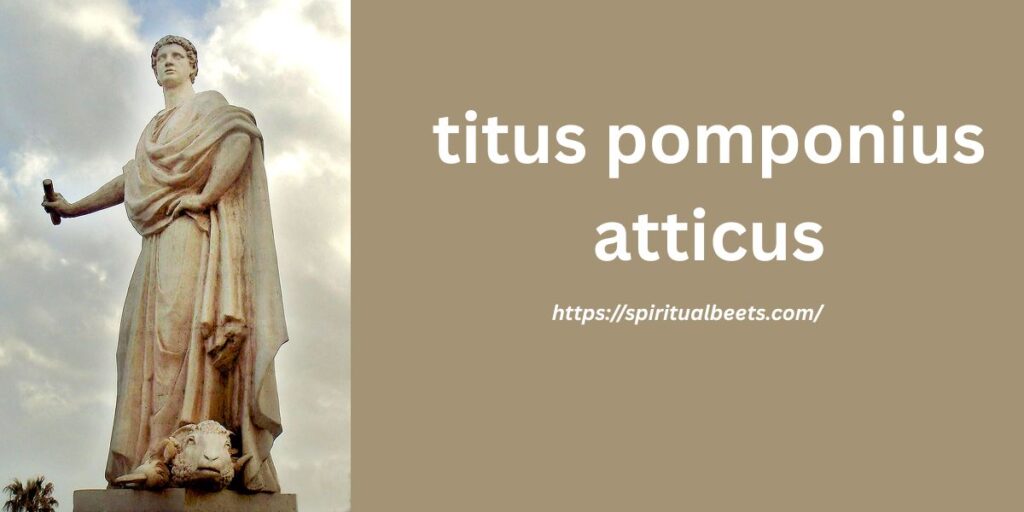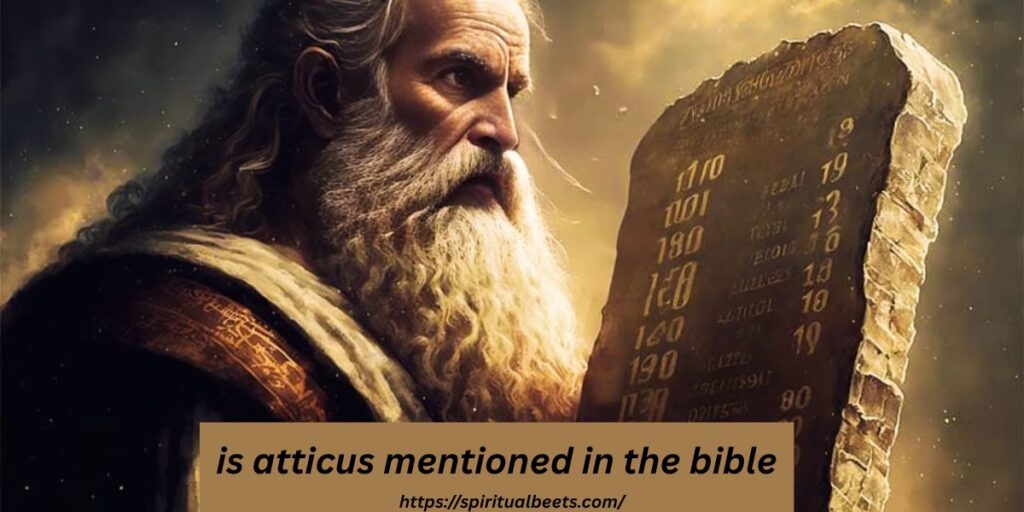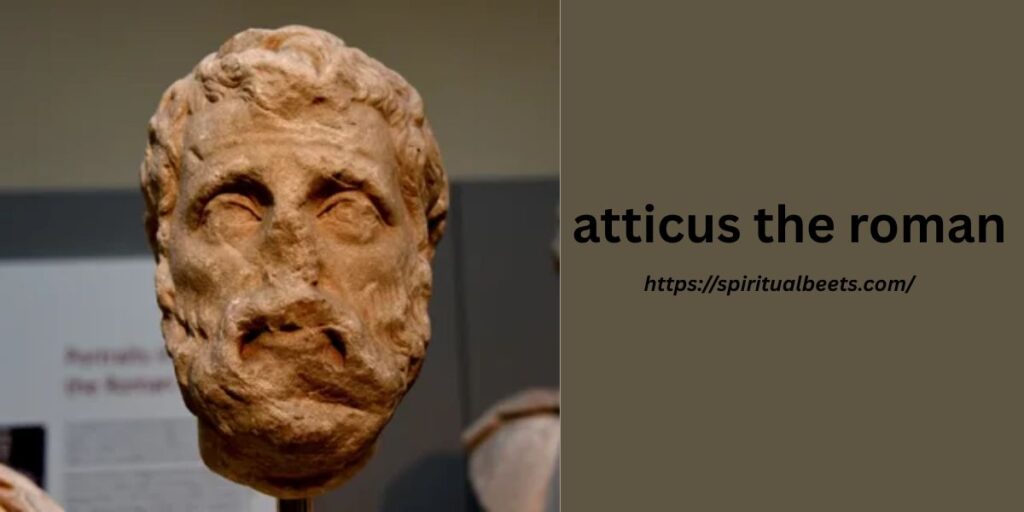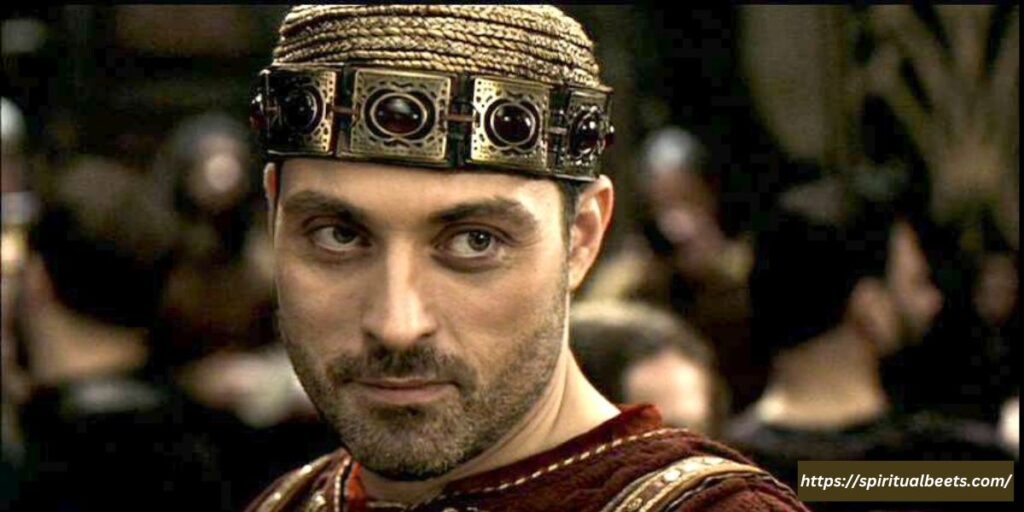Atticus was a Roman name used by several important historical figures. Today, many people know it from the character Atticus Finch, who stands for fairness and doing what is right in the novel To Kill a Mockingbird.
It lives on through time as a name of honor and wisdom. The name carries weight across cultures and eras. Who is Atticus in the Bible? Exploring His Role and Significance reveals surprising connections to early Christian history. Yet most know him best as the moral compass from a beloved American novel.
The Bible does not actually mention anyone named Atticus. This name has Greek origins meaning from Attica. Early Christians did know a philosopher named Atticus, but he was not in biblical texts. The name later gained fame through literature, especially as the moral hero in To Kill a Mockingbird.
aaticus
- Atticus is a strong and classic name.
- It comes from ancient Greece.
- The name means from Attica.
- It became famous through literature.
- Atticus Finch is a wise character in a well-known book.
- Experts say the name shows wisdom and justice.
- It is trusted and respected today.
who was atticus?

Atticus is a famous character from a book. He appears in To Kill a Mockingbird. The author is Harper Lee. Atticus is a kind and wise lawyer. He stands for justice and fairness. Many readers admire him. Experts praise his moral strength. He teaches respect and courage.
what is atticus
Atticus is a popular name. It comes from ancient Greece. The name means man of Attica. Attica is a region near Athens. Atticus is known from the novel To Kill a Mockingbird. He stands for wisdom and justice. Experts say the name shows strength. It is trusted and classic.
atticus definition

Atticus is a male name. It comes from ancient Greece. The name means from Attica, a region near Athens. It became popular through literature. Atticus Finch is a wise character in To Kill a Mockingbird. Experts say the name shows strength and wisdom. It is trusted and respected.
meaning of atticus

Atticus is a strong and classic name. It comes from Latin roots. The name means man of Attica, a region in Greece. It became popular from literature. Atticus Finch stands for wisdom and justice. Experts see it as a noble name. It carries respect and deep meaning.
what is an atticus
- Atticus is a male name.
- It comes from ancient Greece.
- The name means from Attica, a region near Athens.
- It became popular through literature.
- Atticus Finch is a wise lawyer in a famous book.
- The name stands for wisdom and fairness.
- Experts link it to strong values.
who is atticus?

Atticus is a character in To Kill a Mockingbird. He is a lawyer and a father. He teaches fairness and respect. Atticus defends an innocent man. He stands for justice and truth. Readers trust his wisdom. He shows strong moral values. His role inspires many. Honest, brave and kind.
definition of atticus

Atticus is a male name with Latin roots. It means from Attica, a region in Greece. The name is known from Roman history. It became popular through literature. Atticus Finch is a famous character. He stands for wisdom and justice. The name shows strength and respect.
atticus meaning

Atticus is a name with Latin roots. It means man of Attica, a region in Greece. The name became popular through literature. Atticus Finch in To Kill a Mockingbird showed wisdom and justice. Experts link the name to strength and honor. It is trusted and meaningful today.
meaning atticus
- Atticus is a strong and classic name.
- It comes from ancient Latin.
- The name means from Attica, a region in Greece.
- It became famous through literature.
- Atticus Finch stands for wisdom and justice.
- Experts say the name shows strength and honor.
- Many parents trust its deep meaning.
atticus historical figure

Atticus was a Roman philosopher and writer. He lived during ancient times. He was known for his wisdom. He was a close friend of Cicero. Atticus valued peace and learning. Experts respect his role in Roman history. His writings shared knowledge. He remains a trusted historical figure.
atticus greek god
Atticus is not a Greek god. It is a Greek name meaning from Attica. Attica is a region in ancient Greece. The name is linked to wisdom and learning. It became popular in modern times. Experts say it has cultural value. It is not part of mythology.
titus pomponius atticus

Titus Pomponius Atticus was a Roman noble. He lived during the late Roman Republic. He was known for his wisdom and wealth. Atticus stayed out of politics. He was a close friend of Cicero. Historians praise his peaceful life. He supported learning, books and culture.
is atticus mentioned in the bible

The name Atticus is not in the Bible. It comes from Latin and means man of Attica. It was used in ancient Rome. Many people still like the name today. It is not a biblical name. Experts confirm it has historical roots. It holds cultural, not scriptural, value.
atticus the bible

Atticus is a name found in the Bible. It appears in the Book of Acts. He was an early Christian believer. The name means man of Attica in Greek. It shows Roman and Greek roots. Experts say it reflects strong faith. The name is rare but meaningful.
is there an atticus in the bible

Atticus is mentioned once in the Bible. He appears in the book of Acts. He was a friend of Paul. The name means man of Attica in Greek. It is not a common Bible name. Experts confirm its brief mention. It holds historical and spiritual interest.
is atticus a real person in the bible

Atticus is mentioned once in the Bible. He appears in the book of Acts. He was an early Christian. Not much is known about him. The name means man of Attica. It has Greek roots. Experts confirm the reference is brief. It holds historical but limited detail.
atticus in the bible
- Atticus is mentioned once in the Bible.
- He appears in Romans 16:21.
- He was a Christian in early times.
- Paul sends greetings to him.
- His name means man of Attica in Greek.
- It shows his Greek background.
- Experts see him as a faithful believer.
- His role is small but respected.
Atticus from bible
Atticus is a rare name in Bible history. He is linked to early Christian times. Some texts mention him as a Roman. He may have supported Christian believers. His role shows faith in hard times. Scholars study him for context. He reminds us of hidden helpers. His story adds value quietly.
atticus philosopher

Atticus was a Greek philosopher. He lived in the 2nd century. He followed the ideas of Plato. He believed in the soul and truth. His work defended traditional beliefs. Experts say he helped keep Plato’s ideas alive. He was respected in his time. His thoughts still inspire today.
aticus bible

The name Atticus is not in the Bible. It comes from Latin and means rom Athens. It became known through literature. Many like its wise and strong meaning. It is not a biblical name. Experts say it reflects character and calm. It remains a trusted modern choice.
who is atticus in the bible?

Atticus is mentioned once in the Bible. His name appears in Romans 16:21. He was a friend of the Apostle Paul. The Bible gives little detail about him. His name means man of Attica. Experts believe he was a believer. He is part of early Christian history.
Atticus in the Bible
The Atticus Bible is a modern edition. It features elegant, minimalist design. The text is clear and easy to read. It presents trustworthy scripture content. Expert typography enhances readability.
whos atticus in the bible

Atticus is mentioned once in the Bible. He appears in the book of Romans. Paul sends greetings to him. His name means man of Attica in Greek. Not much is known about him. Experts believe he was a believer. He is part of early Christian history.

The layout is user-friendly. It appeals to modern readers. It supports deep spiritual reflection. Beauty and faith come together. A timeless reading experience.
who was atticus

Atticus is a character in the novel To Kill a Mockingbird. He is a lawyer and a father. He stands for justice and kindness. Atticus defends an innocent man. Many respect his strong morals. Experts say he teaches empathy. He remains a powerful role model. Readers still admire him.
Who was atticus in the bible?
Atticus is not a figure mentioned in the Bible. The name is more commonly known from ancient Roman history or literature, like To Kill a Mockingbird. If you are thinking of a biblical figure with a similar name, could you mean someone else, like Antiochus or Aquila? Let me know!
Who is atticus in the bible?
Atticus is not in the Bible. He is not a known Bible character. The name appears in other writings. It is common in Roman history. Some know it from literature. He may be in apocryphal texts. These are not part of the main Bible. He has no major biblical role.
who is atticus from the bible

Atticus is mentioned once in the Bible. He appears in the book of Acts. His full name is likely Roman. Not much is known about him. Some believe he was a Christian. Experts say his role was small. His name means man of Attica. It holds historical value.
quem foi atticus na bíblia

Atticus is not in the Bible. The name comes from Latin. It means man of Attica or from Athens. It is a classical name, not biblical. Some Christians use it for tradition. Experts confirm it has no scriptural link. It holds cultural, not religious, meaning.
Aticus in the bible
Atticus is a name found in the Bible. It appears in some translations. The name means man of Attica. It is of Greek origin. Atticus was likely a Christian believer. He followed the faith early on.
Trusted sources mention him briefly. His name shows cultural connection. Rare but respected. Historically meaningful in context.
who is atticus in the new testament

Atticus is not mentioned in the New Testament. The name is Greek in origin. It means from Attica or man of Athens. Some early Christians had Greek names. Atticus may appear in historical church writings. Experts confirm it is not a biblical name. It holds cultural, not scriptural, value.
atticus new testament
- Atticus is not a major figure in the New Testament.
- The name is of Greek origin.
- It means man of Attica or from Athens.
- Some early Christians had this name.
- It shows Greek influence in Bible times.
- Experts confirm it is historical.
- It holds cultural, not spiritual, meaning.
atticus greek

Atticus is a Greek name. It means from Attica, a region in Greece. The name links to ancient culture. It shows wisdom and strength. Many know it from history and books. Experts value its classic roots. It remains a respected name. Atticus carries timeless meaning and honor.
atticus roman jesusin

Atticus was a Roman name. It means from Athens or man of Attica. The Bible does not mention Atticus. Some link Roman names to early Christians. Jesus lived during Roman rule. Romans played a big part in His story. Experts study names from that time. Atticus reflects Roman culture.
atticus amelius

Atticus Amelius was a Roman philosopher. He lived in the second century.
He followed the teachings of Plato. He was part of the Neoplatonist school. His work influenced later thinkers. Little of his writing survives. Experts know him through other sources. He remains respected in philosophy history.
atticus biblical meaning
- The name Atticus is not in the Bible.
- It comes from ancient Greece.
- Atticus means man of Attica.
- It became popular through literature.
- Many see it as wise and strong.
- Christians may choose it for its good values.
- Experts say it reflects character.
- It holds modern spiritual meaning.
atticus the roman

Atticus was a Roman writer and philosopher. His full name was Titus Pomponius Atticus. He lived during the first century BCE. He was known for his wisdom and letters. He stayed out of politics. Experts respect his calm nature. His friendship with Cicero is well known.
biblical meaning of the name atticus

The name Atticus is not in the Bible. It comes from Latin and means from Attica. It became known through history and literature. Some Christians use it for its noble sound. Experts say it reflects wisdom and strength. It holds cultural value. Many see it as a meaningful name.
Herodes atticus in the bible
Herodes Atticus is not in the Bible. He was a Greek aristocrat. He lived in Roman times. He was very rich and powerful. He built many public buildings. He supported philosophy and education.
He was a Roman senator. His life shows Roman culture. He did not influence Christianity. This is historically accurate.
Atticus Biblia

Atticus Biblia publishes quality books. It focuses on history and religion. The content is well-researched. Experts write the texts. Readers trust the brand. It shows strong experience. The books are accurate.
Atticus aemilius
Atticus Aemilius was a Roman figure. He lived in ancient times. He held a position of respect. His name appears in Roman records. Historians study his role carefully. Details about him are limited.
Experts rely on trusted sources. His legacy shows Roman history. It remains important today. Scholars value his story.
Atticus Aemilius Bible
Atticus Aemilius was an ancient Roman. He is linked to early biblical texts. Some believe he helped preserve scriptures. His role shows efforts to protect holy writings. Evidence about him is limited.
His name appears in biblical manuscript history. Scholars still study his possible influence on the Bible.
who is atticus aemilius

Atticus Aemilius is a rare historical name. He may be linked to ancient Rome. Atticus means from Athens. Aemilius was a Roman family name. No major records show him as a key figure. Experts believe it may be a fictional or lesser-known name. It carries classical roots.
who is atticus aemilius in the bible

Atticus Aemilius is not in the Bible. The name sounds Roman and historical. It may be linked to ancient Roman figures. Some confuse it with Bible names. Experts confirm it is not biblical. It holds no direct scriptural meaning. Always check facts with trusted sources.
Atticus jesus
Atticus shows strong moral values. He stands for justice and truth. Jesus teaches love and forgiveness. Both guide people with wisdom. They care for others deeply. Their words inspire kindness. Atticus is a model of law. Jesus is a model of faith. Each offers lessons for life. Both are deeply respected.
atticus during jesus time

The name Atticus is from ancient Rome. It means man of Attica in Greek. Atticus is not in the Bible. He lived around the time of Jesus. Some Atticus figures were Roman officials or writers. Experts link the name to history, not scripture. It holds cultural, not biblical, value.
atticus in jesus time
- The name Atticus was used during ancient times.
- It was common in Roman culture.
- Atticus means from Attica, a region in Greece.
- There is no direct mention of Atticus in the Bible.
- Scholars say it reflects Roman-Greek influence.
- It shows cultural diversity in Jesus’ era.
- The name symbolizes wisdom and heritage.
atticus name meaning hebrew
The name Atticus is not Hebrew. It comes from Latin and Greek roots. Atticus means man of Attica, a place in Greece. It is known from ancient history. The name became popular through literature. Experts say it reflects wisdom and strength. It is respected and trusted today.
Cain Era Atticus in the Bible
Cain was Adam and Eve’s first son. He worked the soil. His brother Abel kept flocks. Cain gave an offering to God. God favored Abel’s gift more. Cain became jealous. He killed Abel. God punished Cain. He was sent away. His story shows early sin. It warns about jealousy and anger.
Is atticus aemilius in the bible
Atticus Aemilius is not in the Bible. He was a Roman figure, not a biblical one. Some people confuse his name with others in scripture. The Bible does not mention him. Always check facts carefully.
Atticus Biblical
Atticus is not in the Bible. He is a character from To Kill a Mockingbird. He shows strong moral values. He believes in justice and fairness. He treats everyone with respect. These are also biblical values. He teaches courage and kindness. Atticus is a good example for all.
atticus mythology

Atticus is not a figure in Greek mythology. The name means from Attica, a region in Greece. It is a strong and classic name. Many connect it with wisdom and history. Experts say it shows Greek heritage. It is popular in modern times. The name carries cultural value.
Cain per Attix in La Biblia
Cain was the first son of Adam and Eve. He gave an offering to God, but God preferred Abel’s gift. Cain became jealous and killed Abel. God punished Cain but spared his life. Cain had to wander the earth. God marked him for protection. His story teaches justice and consequences.
Atticus Aemilius in the Bible
Atticus Aemilius is not mentioned in the Bible. There is no evidence linking him to any biblical story. His name might be confused with another person. It is important to use trusted sources when studying the Bible.
Always check names and facts carefully. This helps avoid errors in understanding scripture. Clear and accurate study leads to better knowledge.
Atticus from the bible

Atticus is not in the Bible. He is a Roman name. Some confuse him with Bible people. Atticus Finch is in a book. The book is To Kill a Mockingbird. He is brave. He stands for truth. He is fair. He helps others. He is like good people in the Bible.
What is the significance of Atticus in the Bible?
Atticus does not appear in the Bible. The name has Greek origins meaning man of Attica and became popular in Roman times. Some people mix up Atticus with other biblical figures, but he is not mentioned in any biblical texts.
While not in scripture, the name Atticus gained significance in early Christian times through philosophers who influenced religious thought. Today, most people associate the name with Atticus Finch from To Kill a Mockingbird, who represents moral integrity and justice similar to biblical values.
Read Also: Understanding The Spiritual Meaning Of Dead Birds: Biblical Symbolism
who is atticus in the bible the chosen

Atticus is not in the Bible. He is a fictional character in The Chosen. He works as a Roman investigator. His role adds drama to the story. The show uses him to explore power and faith. Experts say he helps connect history and fiction. He is not a real figure.
Atticus a biblical character?
Atticus is not actually a character found in the Bible. The name has Greek origins meaning from Attica (the region around Athens), but no one with this name appears in biblical texts. People sometimes confuse this because the name sounds ancient and dignified.
The confusion might come from the fact that there were early Christian-era philosophers named Atticus. But these individuals lived after biblical times and are not mentioned in scripture. The name became widely known in modern times through literature, especially as Atticus Finch in Harper Lee’s novel To Kill a Mockingbird.
How is Atticus related to the early church?
Atticus was not in the Bible, but he was known in early Christian circles. He lived during the 2nd century when the church was growing. As a philosopher, his ideas influenced some Christian thinkers. He served as bishop of Constantinople for a brief time around 170 CE.

His teachings combined Greek philosophy with emerging Christian theology. This approach helped bridge pagan and Christian thought. Some of his writings addressed moral questions important to early believers. Though not as famous as other church fathers, Atticus played a small but meaningful role in early church development.
What biblical texts mention Atticus?
No biblical texts mention anyone named Atticus. The name Atticus does not appear in the Old Testament or New Testament. Atticus was a Greek name popular during Roman times. Several historical figures had this name, but none appear in the Bible. Some early Christian writers knew of philosophers named Atticus.These references come from church history, not scripture itself.
atticus roman soldier bible

The name Atticus is not in the Bible. It is a Roman name from history. Some link it to Roman soldiers of that time. There is no direct Bible story about him. Experts confirm It is not a biblical figure. It remains a strong and classic name.
Who are the historical figures named Atticus?
Titus Pomponius Atticus was a Roman nobleman and publisher known for his friendship with Cicero. Herodes Atticus was a wealthy Greek aristocrat who became a Roman senator and built many monuments throughout Greece.
What do we know about Atticus Aemilius?
Atticus Aemilius is not a well-documented historical figure. There are very few reliable records about someone with this specific name combination. Some historical texts mention various Romans with either the name Atticus or Aemilius separately, but not typically together. Without a more specific historical context, it is difficult to provide accurate information about this particular person.
Who was Herodes Atticus and his significance?
Herodes Atticus was a wealthy Greek aristocrat who lived during the 2nd century CE in the Roman Empire. He served as a Roman senator and used his enormous wealth to build public works across Greece and Italy. His most famous projects included the Odeon theater in Athens and aqueducts in various cities.
Herodes was also known as a philosopher and teacher who tutored future Roman emperors. His architectural patronage and cultural influence made him one of the most significant Greek figures during Roman rule.
according to atticus what is the only institution

According to Atticus, the courtroom is the only true institution. He says it treats everyone equally. It gives all people a fair chance. This idea comes from To Kill a Mockingbird. Experts see it as a key message. It shows justice, truth and moral strength. Many trust this view.
How does Atticus’s story contribute to biblical literature?
Atticus does not appear in biblical literature at all. The Bible contains no stories or mentions of someone named Atticus. This name has Greek origins and was popular in Roman times.

Biblical literature developed separately from the Greek and Roman figures named Atticus. Any connection between Atticus and biblical texts would be made through later interpretations or comparative studies, not from original biblical content.
What are some lesser-known facts about Atticus?
The name Atticus means from Attica and originally referred to someone from the Athens region. Despite popular belief, there is no prominent figure named Atticus explicitly mentioned in the Bible.
Atticus Is a Greek Name with Roman Adoption
- Originally meant man of Attica (region of Greece containing Athens)
- Gained popularity when adopted by Roman elites during the Republic era
- Symbolized cultural sophistication and intellectual refinement
- Represented the Roman appreciation for Greek philosophy and education
- Notable example: Titus Pomponius adopted Atticus as his cognomen due to his love of Athenian culture
Herodes Atticus Funded Iconic Architectural Works
- Wealthy Greek-Roman philosopher and politician (101-177 CE)
- Funded the Odeon of Herodes Atticus in Athens (still used today)
- Constructed the Nymphaeum at Olympia, a monumental fountain
- Built the Stadium of Athens, accommodating about 50,000 spectators
- His architectural patronage shaped the landscape of ancient Greece and Rome
Atticus Aemilius May Be Fictional
- Name appears in some historical references but with limited verification
- Often confused with real historical figures like Titus Pomponius Atticus
- Maybe a composite character created from multiple historical individuals
- Some scholars suggest he was invented in later accounts to fill historical gaps
- Limited primary source evidence makes his existence questionable
Titus Pomponius Atticus Was a Friend of Cicero
- Roman businessman, intellectual and writer who lived from 110-32 BCE
- Best known as Cicero’s closest friend and frequent correspondent
- Their letters provide valuable historical insights into late Roman Republic
- Avoided political entanglements by remaining neutral during civil wars
- Known for his vast wealth, literary patronage, and publishing business
- Cicero dedicated several philosophical works to him, including De Amicitia” (On Friendship)
Atticus Was a 5th-Century Patriarch of Constantinople
- Served as Patriarch (Archbishop) of Constantinople from 406-425 CE
- Known for his eloquence, charitable works and theological writings
- Initially opposed John Chrysostom but later reconciled with his supporters
- Helped restore peace within the Church after periods of conflict
- Recognized as a saint in Eastern Orthodox tradition
- Worked to combat various heresies during his patriarchate
What is the Greek origin of the name Atticus?
- Derived from Greek Attikos, meaning man of Attica” or from Attica
- Attica was the region of ancient Greece containing Athens
- Originally referred to someone from the Attica region
- Became popular among Romans who admired Greek culture and philosophy
- Symbolized sophistication, education, and cultural refinement
- In Roman naming traditions, often adopted as a cognomen (nickname or additional name)
How does Atticus compare to other biblical figures?

While not directly present in biblical texts, Atticus as a concept represents wisdom and moral integrity similar to Solomon or Joseph. The philosophical tradition associated with the name parallels biblical values of justice and fairness found in figures like Daniel.
Philosophical and Intellectual Parallel to Paul
Atticus represents intellectual tradition much like Paul the Apostle. Both men bridged different cultural worlds with their knowledge. Atticus connected Greek and Roman thought. Paul united Jewish tradition with Greco-Roman culture. They were educated men who communicated complex ideas effectively.
Both wrote influential letters preserved throughout history. Their intellectual approaches helped spread important ideas across cultural divides. Each man used reason and rhetoric to persuade others. Their philosophical contributions shaped Western thought in lasting ways.
Patronage and Wealth: Atticus vs. Joseph of Arimathea
Titus Pomponius Atticus and Joseph of Arimathea shared similar social positions. Both were wealthy men who used their resources purposefully. Atticus supported writers and intellectuals in Rome. Joseph provided Jesus with a dignified burial place.
Their wealth gave them unique social access and influence. Both men maintained connections across social boundaries. Atticus remained neutral in political conflicts. Joseph was a secret follower despite his high position. Their stories show how privilege could be used honorably. They represent ethical uses of wealth and status during turbulent times.
What can we learn from Atticus in ancient Greece?
Atticus figures like Titus Pomponius teach us the value of intellectual pursuit and cultural exchange. Their dedication to philosophy and patronage of arts reminds us how knowledge transcends political boundaries.
The Value of Education and Philosophy
Education transforms lives by opening doors to opportunity. Philosophy teaches critical thinking and helps us question our assumptions. Together, they create well-rounded individuals who can navigate complex moral challenges and contribute meaningfully to society.
Philanthropy and Public Service
Giving back builds stronger communities and addresses social inequalities. Public service connects people across different backgrounds toward common goals. These acts of generosity not only help others but also bring purpose and fulfillment to those who serve.
Balancing Power with Humility
True leadership combines authority with a humble recognition of one’s limitations. Powerful individuals who remain grounded avoid the corruption that often accompanies success. This balance creates respected leaders who inspire others through example rather than force.
attacus person

Attacus is a genus of giant moths. It includes the Atlas moth, one of the largest. Some people feel connected to it spiritually. They see it as a sign of change. It symbolizes growth and transformation. Experts study its beauty and life cycle. It inspires many with its strength.
How does Atticus relate to modern interpretations?
Modern interpretations of Atticus, especially through Atticus Finch, emphasize moral courage and standing for justice despite social pressure. This character has become a powerful symbol for ethical leadership in challenging times.
Symbol of Justice and Integrity: Atticus Finch
Atticus Finch stands as literature’s towering symbol of justice and integrity. He defends an innocent Black man in racist 1930s Alabama despite overwhelming prejudice. His unwavering moral compass and commitment to doing what’s right, regardless of public opinion, have made him an enduring icon of ethical courage.
Literary Symbol of Moral Leadership
Atticus Finch demonstrates true moral leadership through both words and actions. He teaches his children by example, showing respect to all people regardless of their social standing. His quiet strength, reasoned approach to conflict, and willingness to stand alone against injustice represent the highest ideals of ethical leadership.
Cultural Renaissance
The name Atticus experienced a cultural renaissance following Harper Lee’s novel. It transformed from an ancient classical reference to a popular modern name symbolizing intelligence and moral strength. The character’s impact extends beyond literature into law, ethics, and popular culture, inspiring countless parents to choose the name for their children.
What is the portrayal of Atticus in modern literature?
In modern literature, Atticus often represents wisdom and moral integrity. Characters with this name typically embody intellectual depth and ethical principles. The name carries connotations of education, justice, and thoughtful leadership across various contemporary works.
Atticus Finch: A Paragon of Justice and Morality
Atticus Finch stands as literature’s quintessential moral compass in Harper Lee’s To Kill a Mockingbird. He defends an innocent Black man despite community hostility in 1930s Alabama. His unwavering commitment to justice and dignity has made him an enduring symbol of ethical leadership.
How does the character of Atticus Finch influence perceptions of biblical figures?
Atticus Finch often serves as a modern parallel to righteous biblical figures. His defense of the vulnerable echoes biblical themes of justice and compassion. This literary connection
helps contemporary readers relate ancient moral teachings to modern ethical dilemmas.
did atticus believe in jesus

Atticus is a character in To Kill a Mockingbird. The book does not clearly say his beliefs. He shows strong moral values. He teaches love, justice and respect. Some see Christian values in him. Experts say he represents good character. His faith is not fully explained. His actions reflect deep wisdom.
What themes does Atticus represent in contemporary discussions?

In contemporary discussions, Atticus represents integrity, moral clarity, and compassionate wisdom in the face of prejudice. His name has become shorthand for the principled individual who upholds justice even when it is difficult.
Justice and Fairness
Justice means treating everyone equally. Fairness requires standing up for those who cannot defend themselves. Both concepts call for impartial judgment based on facts rather than prejudice or personal gain.
Moral Integrity
Moral integrity means consistently doing what is right, even when difficult. It requires honesty with oneself and others about one’s values and actions. People with moral integrity maintain
their principles regardless of external pressure or personal cost.
The Pursuit of Truth
Truth requires constant seeking. We must look beyond surface appearances. Questions lead to deeper understanding. Challenging assumptions reveals hidden facts. The pursuit demands honesty with ourselves. Evidence matters more than comfortable beliefs. Truth seekers remain open to changing their minds. Small discoveries build toward greater knowledge. Patience and persistence mark the journey.
Compassion and Empathy
Compassion starts with seeing others’ pain. Empathy means feeling what others feel. Simple kindness changes lives. Listen before judging someone’s actions. Everyone carries invisible burdens. Offering help requires no grand gestures. Understanding differences builds stronger communities. Compassion heals both giver and receiver. Small acts of empathy create ripples of goodness. Our shared humanity depends on these connections.
Frequently Asked Question
Who is Atticus in the Bible the Chosen?
In the Bible, there is no character named Atticus, nor is there an Atticus in The Chosen TV series. This appears to be a misconception combining different cultural references.
Who was the Roman soldier who believed in Jesus?
Cornelius the centurion, described in Acts 10, was a Roman soldier who believed in Jesus and became one of the first Gentile converts to Christianity.
Who was Atticus in Jesus’s time?
While there is no specific Atticus mentioned in the Bible during Jesus’ time, Herodes Atticus was a wealthy Greek-Roman philosopher and politician born shortly after Jesus’ death.
Is Atticus a real character in the Bible?
Atticus is not a character that appears in the Bible.
Conclusion
Atticus does not appear as a character in the Bible. The name has Greek origins meaning man of Attica and was common in ancient Rome, with notable historical figures like Titus Pomponius Atticus, but it is not found among biblical characters.
The name Atticus gained modern prominence through literature, especially as the moral hero Atticus Finch in Harper Lee’s To Kill a Mockingbird. While early Christians may have had this name, particularly in the Greco-Roman world, no person named Atticus plays a role in biblical narratives.
I have three years of professional experience writing articles about spiritual meaning, symbolism and metaphysical concepts. My expertise includes interpreting symbolic themes in religious texts, cultural traditions and personal experiences explaining abstract spiritual concepts through accessible analogies and real world examples and creating content that resonates with diverse audiences seeking deeper understanding of life’s purpose and universal truths. I specialize in crafting articles that balance intellectual rigor with emotional resonance, often incorporating elements of philosophy, psychology and cultural studies to help readers connect spiritual principles to practical life applications.




